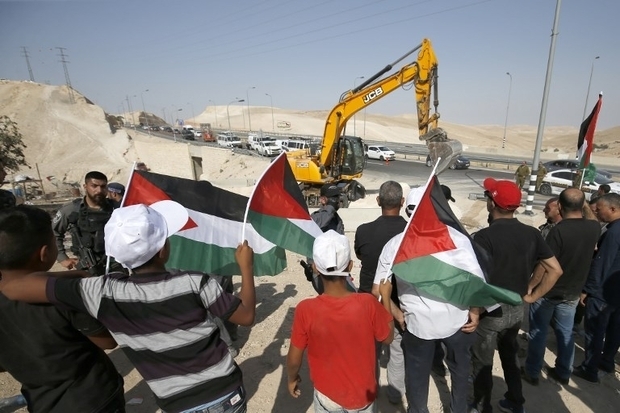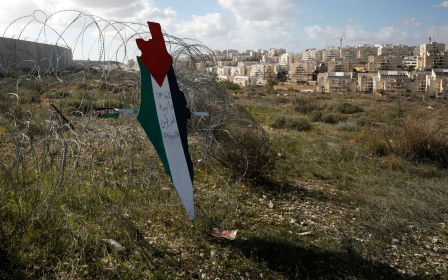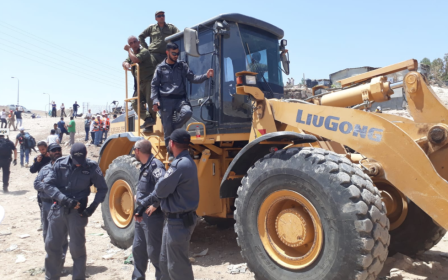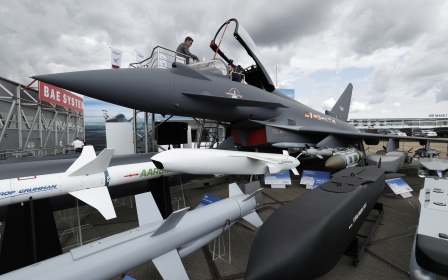UK to investigate claims JCB machinery used by Israel to demolish Palestinian homes

The British government will investigate claims that machinery built by UK construction company JCB was used in the demolition of Palestinian homes and construction of illegal Israeli settlements in the occupied Palestinian territories (OPT).
The UK National Contact Point (NCP), which is part of UK’s Department of International Trade, acknowledged on Monday a complaint against JCB submitted by British legal charity Lawyers for Palestinian Human Rights (LPHR).
A key function of the NCP is to consider complaints that a multinational based or operating in the UK is in breach of the Organisation for Economic Cooperation and Development (OECD) guidelines for multinational enterprises.
The NCP said that complaints made by the charity against JCB in relation to the use of its machinery in Israel’s illegal demolitions and settlement constructions in the occupied territories warranted further investigation.
The complaint claims that JCB contributed and is directly linked “through their business operations” to Israel's home demolition policies targeting Palestinians.
New MEE newsletter: Jerusalem Dispatch
Sign up to get the latest insights and analysis on Israel-Palestine, alongside Turkey Unpacked and other MEE newsletters
An initial assessment posted by the NCP included an acknowledgement by JCB that evidence submitted by LPHR showed JCB’s machinery was used to demolish Palestinian Bedouin homes in the OPT.
The NCP said it accepted complaints that JCB did not actively prevent or seek ways to prevent or mitigate adverse human rights violations created by the use of its machinery, nor did it express a commitment to human rights.
Tareq Shrourou, the director of LPHR, welcomed the NCP’s initial assessment and its calls to hold a mediation between the law charity and JCB.
“JCB’s apparent failure to address the material and prolific use of its products in demolition and displacement incidents that cruelly impact Palestinian families, and also its use in settlement-related construction, which creates pervasive human rights violations, must cease immediately,” Shrourou said in a statement.
“We look forward to constructively engaging with JCB and expect it will do the right thing by complying with its human rights responsibilities," he added.
"LPHR’s objective of ending JCB’s unacceptable involvement in human rights violations against Palestinians should be a shared one.”
JCB did not respond to Middle East Eye's requests for comment at the time of publication.
Within the NCP’s initial assessment, JCB accepted that LPHR submitted evidence that showed its machinery was used to demolish homes and other structures within the occupied territories.
The UK-based construction company, however, believes that it has no “legal ownership” of its machinery once it’s sold to Comasco - a third-party distributor that sells JCB equipment in Israel.
The NCP will now offer a mediation between JCB and the LPHR to resolve complaints made by the legal charity. If the mediation fails, the NCP will launch an independent investigation into JCB’s rights violation of the OECD guidelines.
History of rights violations
JCB’s operations in Israel have been mired in controversy and faced heavy criticism from rights activists.
Earlier this year, JCB was on a list released by the UN Human Rights Council that said the construction company had ties to illegal Israeli settlements.
The council compiled the list after and said the companies listed had facilitated the construction of settlements, supplied them with surveillance equipment, or provided security services to enterprises operating there.
In 2018, Middle East Eye revealed that JCB drilling equipment was outside of Khan al-Ahmar, a Palestinian village in the central occupied West Bank long threatened with demolition by Israel.
In 2012, JCB's equipment was used to demolish homes in Silwan, a Palestinian neighbourhood in occupied East Jerusalem. The company dominates the Israeli market with a 65 percent market share of all excavators and a 90 percent market share of commonly used loading vehicles in the country.
The company only started to produce specially built military-grade construction vehicles in 1984. Through its offshoot JCB Defence Products, it has supplied 3,500 vehicles to the military forces of 57 countries.
Middle East Eye delivers independent and unrivalled coverage and analysis of the Middle East, North Africa and beyond. To learn more about republishing this content and the associated fees, please fill out this form. More about MEE can be found here.




